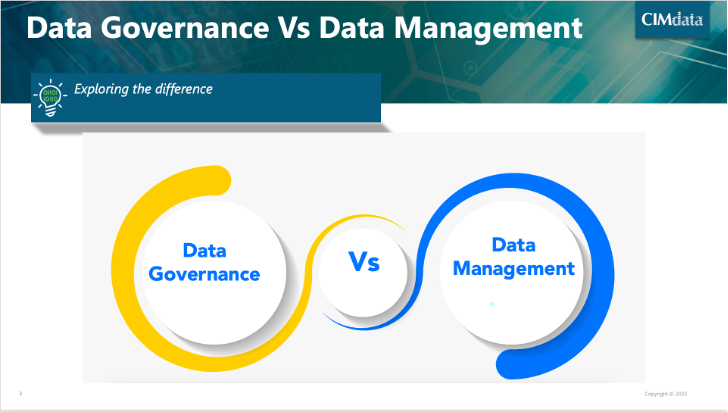A recurring question has emerged in recent conversations: What exactly sets data governance apart from data management? It's a valid inquiry, as the terms are sometimes used interchangeably, leading to confusion. In this blog, I will shed light on the distinction between data governance and data management, clarifying their roles and significance within the realm of effective data practices. So, let's dive in and unravel the nuances of data governance versus data management.
I think it is important to raise awareness about the distinctions between data governance and data management to ensure proper implementation and effective data management practices can be followed within an organization.

Data governance and data management are two related but distinct concepts within the field of data management, and the following is a summary of their differences.
Data Governance:
- Focuses on the strategic planning, implementation, and oversight of data-related activities within an organization.
- Focuses on the governance, control, and strategic aspects of managing data assets.
- Defines roles, responsibilities, and accountability for data-related activities and decision-making.
- Involves establishing policies, processes, and frameworks to ensure the proper management, quality, integrity, privacy, and security of data.
- Aims to align data management practices with organizational goals, regulations, and compliance requirements.
- Ensures data is used, protected, and governed effectively, addressing risks and ensuring data-related decision-making is consistent and aligned with business objectives.
Data Management:
- Focuses on the day-to-day processes, technologies, and practices for managing data effectively.
- Encompasses the operational and technical activities involved in managing data throughout its lifecycle.
- Involves data modeling, data architecture, data integration, data quality management, data storage, and data retrieval.
- Includes tasks such as data collection, storage, integration, transformation, analysis, and dissemination.
- Ensures the availability, reliability, accessibility, and usability of data for business operations, decision-making, and analytics.
- Addresses the operational and tactical aspects of managing data within systems and databases.
I trust that this information gave you a clearer understanding of the difference between data governance and data management. Please feel free to reach out to me if you require any additional information or have specific inquiries.
Janie
